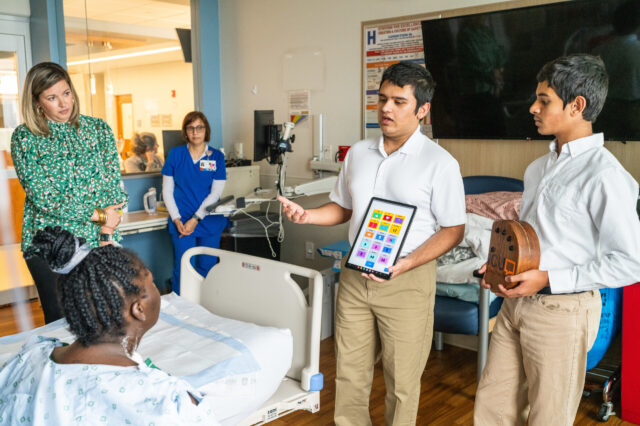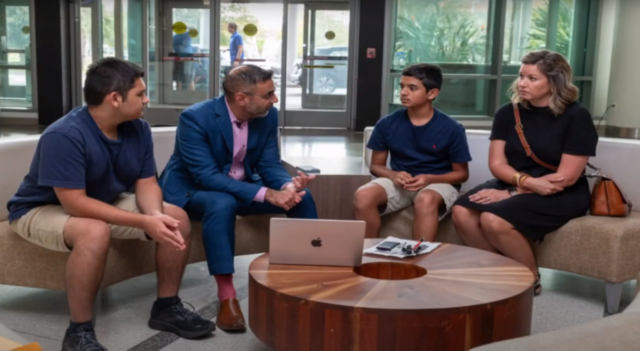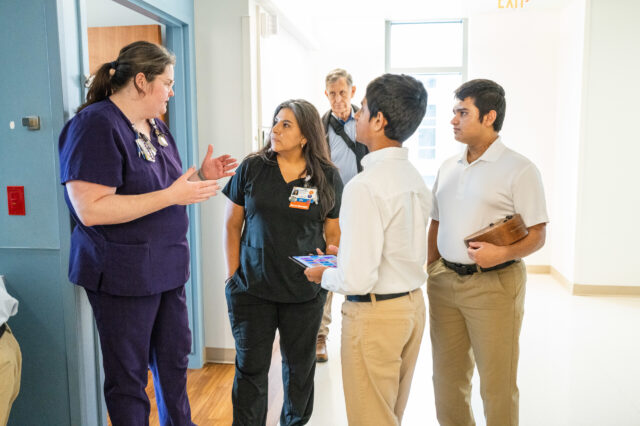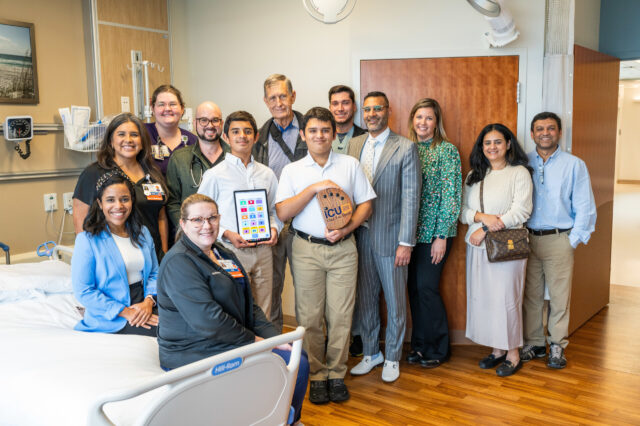Students Recognized for Developing 'ICUSpeak' App Alongside UF Health and Its Patients

When Freddie Taylor opened his eyes, he was where most people are after intensive surgery: in a hospital bed, being closely monitored by his health care team while attached to all sorts of equipment monitoring his every breath. Still, he couldn’t have felt more disconnected.
The 72-year-old couldn’t speak, and his motor function was impaired. He just wanted to ask questions about the procedure he had just undergone or simply what day it was. Staying calm was essential for his recovery, but that was easier said than done.
“He tried to make hand gestures to his sons,” said Laila Taylor, his daughter-in-law. “The boys and several nurses tried to figure out what he was asking, but nothing worked and his agitation increased.”
Freddie was trying to bounce back from surgery to implant a left ventricular assist device, or LVAD, into his chest at UF Health in April 2023. The artificial pump was needed because his heart was unable to deliver enough blood to meet his body’s needs, an issue he was aware of since his 2008 congestive heart failure diagnosis.
Surgery patients must often be intubated — a breathing tube that’s inserted in the mouth or nose and into the trachea — and it often results in post-surgery sore throat or hoarseness. Sometimes, as in Freddie’s case, it leaves them with temporary vocal cord paralysis.
“Most questions probably seem trivial to others, but for the patient, answered questions are important,” Freddie said. “Being able to text would have been some comfort, but I realize that texting would have probably required more dexterity than I might have had at the time.”
Seeing her father-in-law’s condition and imagining others stranded on a similar island of silence made Laila think there had to be a way to help.
“Sitting in the lobby, I started trying to figure out if there were any applications available for patients who undergo procedures where they wake up and cannot communicate,” Laila said. “I also wondered about physical devices that could communicate to the app between patients, their medical staff and family, to which I found that there was no such device readily available.”
She wouldn’t need to find someone all the way in Silicon Valley for a solution. All she had to do was start by asking a student in her middle school class.
Laila taught an eighth grade App Inventor class at Hahira Middle School in South Georgia, about 20 minutes north of Valdosta. One of her students, 13-year-old Aarav Dave, was to compete in the Congressional App Challenge. The nationwide event is an initiative by the U.S. House of Representatives that encourages the nation’s middle and high school students to create their own original apps.
Aarav — and his 16-year-old brother Aarin, who attends Lowndes High School — spent several weeks trying to come up with an idea. But not just any idea.
“While both Aarav and Aarin enjoy coding and developing projects, they find even more fulfillment in applying their knowledge toward helping others,” said Komal Dave, their mother. “After many weeks of discussion, Laila discussed Freddie’s condition after his LVAD surgery, and she suggested that they should develop a solution for this problem, if it’s possible.”
Aarav and Aarin were intrigued, notably by the amount of risk that a minor communication frustration could hold for thousands of patients experiencing similar postsurgery conditions. In Freddie’s case, any agitation could damage his heart.
The brothers decided this was the idea that would allow them to impact lives, but they’d need some guidance first.
With Laila as their adviser, the brothers spent time with relevant experts who could give them feedback. They started out by collaborating with a speech-language pathologist at their school, Dr. Hallie Eckdahl. The brothers were able to look at devices and programs students use in her classroom.


Then, Laila connected them with UF Health cardiologist Mustafa Ahmed, MD, who specializes in advanced heart failure and transplant. Dr. Ahmed and other staff members organized several visits to UF Health so the brothers could meet with a panel of experts that included doctors and nurses, as well as target patients, to demonstrate their app and receive invaluable input.
“Dr. Ahmed provided real-life insight in developing the app,” Aarav said. “Dr. Ahmed met with us at the UF Health Heart & Vascular Hospital, where we were able to test out our app and physical device with patients, in clinic and at rounds, with similar communication barriers.”
Laila said the students’ contact with Ahmed and others was essential for the app, taking it from hypothetical to tangible.
“I cannot begin to explain how awesome this experience was for my students,” Laila said.
With experts pointing them in the right direction, Aarav and Aarin were ready for the next step.

Early on, they determined that they’d need both an app and a physical device. They first developed the software, a process that took about two months. Aarav made the bulk of the user interface and its associated code. Aarin set up the database and connected it to the app. The connected database would allow doctors to load patients’ preferences to the cloud.
After a few successful prototypes, Aarav and Laila began work on the physical device. Making this hardware was complicated because they wanted to optimize patient experience and comfort while prioritizing aesthetics and stability. That took about a month.
The finished app and device, which Aarav named “ICUSpeak,” delighted Dr. Ahmed.
“The device was very intuitive and was an improvement in the touch-board style communication aid we presently use in many of the units at UF Health,” Dr. Ahmed said. “The ICUSpeak device may help improve patient and nursing communication, helping folks to avoid the frustrations experienced by limitations in being able to speak during the need for intubation and afterward. It can also improve nursing and provider communication to the patient, and go a long way in the healing and recovery process.”
ICUSpeak clearly made a similar impression on the judges as Aarav and Aarin became Congressional App Challenge winners for Georgia’s 8th District.
The brothers will be back in Gainesville soon. The two were invited to the ventricular assist device unit’s VAD VIP Day on Jan. 25 at the UF Health Heart & Vascular Hospital, when Dr. Ahmed will devote time to shine a light on the boys and their app.
Efforts are underway to make ICUSpeak production-ready early this year. The family will pursue a patent, along with copyright registration. As Congressional App Challenge winners, their copyright registration fees are waived.
Komal, the boys’ mother, says there are a few similar devices on the market, but most are outdated, don’t reflect modern accessibility standards and aren’t as patient-friendly as ICUSpeak.
The goal is for ICUSpeak to become a valuable tool to an overlooked problem, and one that bridges the gap between patients like Freddie and their caregivers.
“As the developers of ICUSpeak, we recognize that doctors, nurses and medical staff around the world tackle the complex task of fulfilling the needs of patients, especially after an intensive surgery,” Aarav and Aarin said in a joint statement. “We strongly believe that ICUSpeak will help nurses streamline post-surgery patient communication and thus provide the best hospitality to patients.”
About the author

